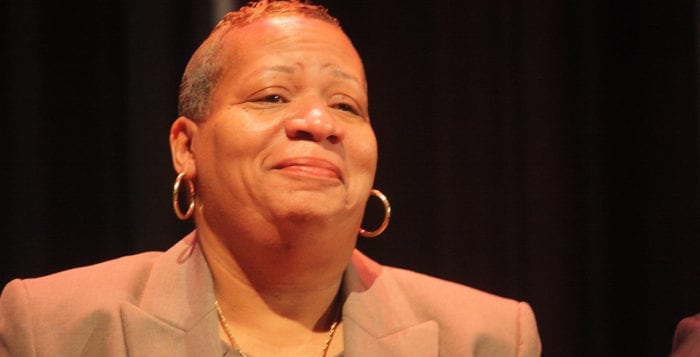Politicians, coaches, veterans, police officers, firefighters and volunteers reflect on Black History Month
By Kevin Redding
African-American figures, leaders and movers and shakers across Suffolk County reflected on their lives and accomplishments to commemorate Black History Month.
David Lewis, Smithtown volunteer firefighter/retired NYPD officer
When David Lewis and his family moved to Smithtown from Hollis, Queens, in 1977, he said they were one of just two black families in the community. He was 7 years old and said he immediately saw the effect their skin color had on residents in his new hometown. Their property was often damaged, there was name calling, and he said his parents received lots of phone calls from neighbors warning not to send their children to the school district.
“The N-word was a big part of our childhoods, we were told we didn’t belong,” Lewis said. “But I
remember my dad saying, ‘You belong here. I don’t care what they say, I’m sending you to school.’”
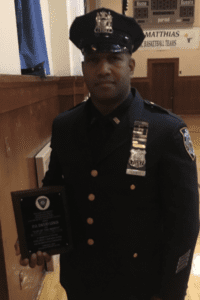
Lewis said his father’s ability to hold his ground lit a fire in him.
“In the back of my mind, I remember thinking that I’ve got to prove to everyone in Smithtown that I belong here,” he said.
Lewis, who grew up in and around the kitchen as the son of a professional chef, started a chocolate and candy business out of his house as a ninth-grader, encouraged greatly by his high school cooking teacher as well as business instructor, who loaned him $100 to buy a mini-refrigerator. He hired local kids to help out and his budding entrepreneurship made headlines in the newspapers. Around that time, Lewis also began a private mentoring program for struggling kids in the neighborhood, many of whom came from broken or single-parent homes.
After graduating from Smithtown High School West, he attended the Culinary Institute of America, became a certified chef and spent a few years working in the industry until he decided to switch gears to pursue a full-time career helping people. Already a volunteer with the Smithtown Fire Department, Lewis joined the New York Police Department, determined to bridge the gap between youth and police. During his 25-year career on the force, Lewis regularly watched over neighborhood youth, encouraging students to do their homework and steering them away from trouble while offering mentorship to youths in Smithtown, Queens and Brooklyn. He received the Commendation Medal from the NYPD in 2000 and eventually retired out of the 104th Precinct.
Outside of the police uniform, he has served as an emergency medical technician; a fire prevention instructor in local communities; a fifth-degree black belt instructor, lending his expertise at Suffolk County PAL Martial Arts; an assistant Scout Master for Cub Scout Pack 340; a volunteer at the Smithtown Guide Dog Foundation; was employed part time as a security official in the Smithtown school district; co-founder of KiDS Need MoRe foundation; and remains an active captain in the fire department.
Through it all, Lewis said the accomplishment that’s meant the most to him was when he received an award for Greatest Person of Smithtown in 2012.
“That was just tremendous to me,” Lewis said. “I thought back to being 7 years old and being told I didn’t belong in Smithtown. That’s one of the things that’s always motivated me here, and [that honor] proved that I do belong.”
Eric Brown, head baseball coach at Suffolk County Community College
For 30 years, Eric Brown has been a coach, mentor and friend to more than 1,000 student-athletes at Suffolk County Community College, where the Coram native also served as campus coordinator and warehouse and mailroom supervisor. He retired as head coach of the men’s varsity baseball team in 2017. During his leadership tenure, he guided his teams to seven National Junior College Athletic Association World Series; won 685 games; was named Region XV Coach of the Year in 1998, 1999, 2000 and 2006; led Suffolk to be named a nine-time winner of the NJCAA Region Umpires Association’s annual sportsmanship award; and was elected into the JUCO Hall of Fame in 2014.
A petition was even created recently calling for the baseball field at Suffolk County Community College Selden campus to be renamed the Coach Eric Brown Field.
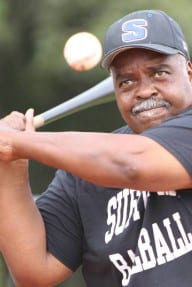
But despite being grateful for all the recognition, Brown, a graduate of the college himself, couldn’t help but laugh about how his career played out. Throughout his years as an athlete at Longwood High School, Brown’s true passions were basketball and soccer — he even went to LIU Post on a soccer scholarship — and baseball was very much an afterthought.
“Baseball was just something I did because everybody else in the neighborhood played it,” Brown said.
He said when he returned to Suffolk, hired as a material control clerk, he was approached by his mentor at the time, who was in charge of the basketball and baseball programs, who brought Brown in as an assistant basketball coach. Through his mentor, Brown learned everything he knew about baseball and soon began coaching the sport himself.
Throughout his career, Brown has been acknowledged for his role as a “player’s coach,” and someone who makes sure the athletes on his team are well-taken care of and successful on and off the field.
“I really care about these kids,” Brown said. “The long and short of it is that they’re more important than the program itself. They are the program.”
Tracey Edwards and Doc Spencer, Huntington elected officials
Former Town of Huntington board member Tracey Edwards, who has served for many years as the Long Island regional director of the NAACP, said while she considers her hometown a great place to live, she
admitted Huntington, and all of Suffolk County, still has a lot to work on when it comes to race relations.
“I would say, as a young person, I had a wonderful experience growing up in the Town of Huntington,” Edwards said. “But as I got older, as I reached adulthood, that’s when bad experiences started to happen. We’re being naive to think there is not still gender, racial and cultural bias where we live, and where everybody else lives.”
Edwards has built a career on trying to make a difference on that front. Since elected by the town in 2014, she has strived to be an exemplary community advocate and public servant — and was especially focused on making Huntington a more inclusive place, regardless of age, race, gender or economics. She has worked to
expand affordable housing legislation for millennials and first-time homebuyers; spearheaded the creation of the Huntington Opportunity Resource Center, a program that offers assistance with résumé preparation and job searches, exploration of career options and access to job training for unemployed and underemployed
residents; and led a strong campaign for Huntington supervisor in 2017, a race she lost to now Supervisor Chad Lupinacci (R).
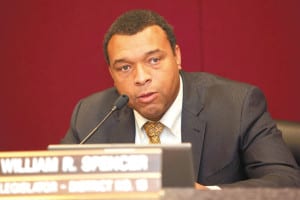
“Being a black woman, it was very difficult for her to run for that position as it was portrayed in the results,” her mother, Dolores Thompson, a lifelong civil activist, said in December. “And yet, her experience and background is far better than most, black or white.”
Edwards pointed to her parents and the way they raised her as her main source of strength and inspiration.
“I was raised to believe and to understand that everyone is equal and to treat everyone with respect,” she said.
Just the third African-American elected legislator in Suffolk County history, William “Doc” Spencer (D Centerport), who is also a beloved physician and ordained minister in his community, agreed with Edwards that the region has plenty to overcome, but also sees every day how far it’s come.
“Long Island has certainly had its struggles with division and difficult race relations but I’m optimistic, just evidenced by the fact that I’ve been chosen to lead by an overwhelmingly white population,” Spencer said. “I don’t believe people look at me as a black man, but, hopefully, as a good doctor, representative and humanitarian. As the only black official in the Town of Huntington, I’m a voice of unity, a voice of harmony and I believe it’s incredibly important that we have acceptance.”
Spencer himself grew up in West Virginia in an area still heavily segregated.
“Most blacks lived on one side of town with substantial divides throughout the area,” he said, reflecting on his upbringing. “I would be stopped by police if I was driving in a particular section. I’ve been chased and called names. I experienced all of that in the 1970s and ’80s. We have made great strides.”
Michael Jordan, president of the Visually Impaired Persons of Suffolk
In 2014, Southampton native Michael Jordan’s life became permanently dark. The U.S. Marine Corps veteran and former Southampton Golf Club employee began losing his eyesight a few years prior in 2011,
so when he went completely blind, he was ready for it, determined to stay active, independent and productive. That same year, he joined the Visually Impaired Persons of Suffolk, a social group designed to empower and self-advocate the blind community with ties to Deer Park and Port Jefferson. As a member, he noticed that the extent of the “social” aspect of the group was sitting together for a cup of coffee and a donut.
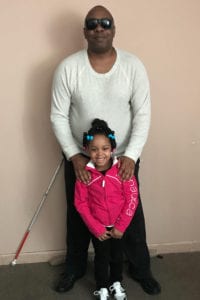
“I said, ‘We’ve got to start being active here,’ if you want to sit around and drink coffee, I can do that home,” Jordan said.
He took the reins as an orchestrator of outings and activities, from fishing and park trips to dinner functions, bowling nights and fundraisers. Members donated funds to five underprivileged families last year.
Jordan, who pays for a majority of the event’s raffles himself, quickly rose to a vice president position and, in 2017, he was elected president of the group.
“All I want to offer is giving, love and joy,” Jordan said. “I like to help people for a day to help them forget about their problems, and that way, they can see someone in an unfortunate situation spreading joy in life.”
Jordan said it’s important to him that his colleagues in the group recognize their importance in life, despite their disabilities.
“I want to show people of Suffolk County that we are people,” he said. “When you look at us, you should just see a resident. You don’t see that I’m blind, you don’t see that I’m in a wheelchair, you don’t see that I’ve got hearing aids, don’t see that I’m in a walker, or what have you.”

